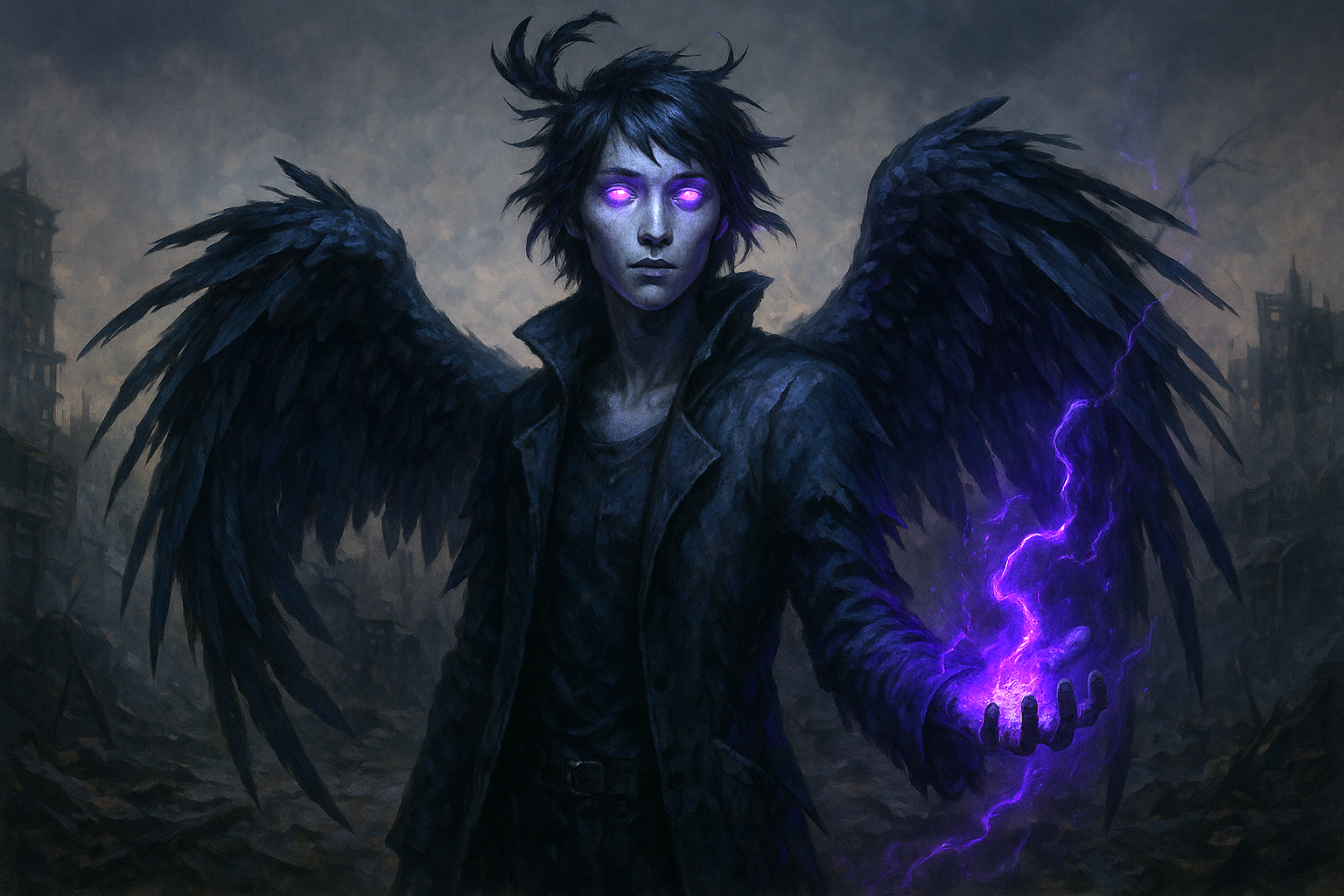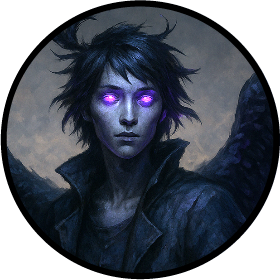Fey Riftling
Fey Riftling
Small Yokai , Neutral
STR
10
( +0 )
DEX
16
( +3 )
CON
14
( +2 )
INT
12
( +1 )
WIS
12
( +1 )
CHA
14
( +2 )
VIG 18 and SAN 12
Deception +4, Insight +3, Perception +3, Slight of hand +5
Passive Perception 13
Description
The Fey Riftling stands as an unsettling figure of elegance and entropy—an androgynous being draped in tattered black, their feathered wings unfurling like shadows torn from reality. Glowing violet eyes pierce through the gloom, pulsing with the same arcane intensity that crackles in their outstretched hand. Their presence is more than physical—it’s psychic, oppressive, like a memory you almost forgot but can’t quite place. As they hover in the ruin-choked air, the boundary between self and silence frays around them. They are a herald of the Rift—not evil, but inevitable—a being made of memory’s edge and the hush that follows forgetting.
The Fey Riftling is curious but cold, fascinated by the emotions and memories of others yet detached from their meaning. They speak in riddles or fragments of forgotten thoughts, treating identity like a game or puzzle. Though not cruel, they are indifferent to suffering—viewing loss and unraveling as natural, even beautiful.
Ideals
The Fey Riftling believes that memory is the truest form of power—shaping reality more deeply than flesh or steel. It seeks to collect and preserve forgotten moments, not to control them, but to witness their beauty as they dissolve. To it, the collapse of identity is not tragedy, but transcendence.
Bonds
The Fey Riftling is bound to the Rift itself, drawn to its resonance like a moth to flame—it cannot stray far without fading. It believes the Rift is a womb of forgotten truths, and it views those who interact with it as midwives or intruders. It longs to become whole by feeding on memories, hoping that through them, it might finally understand what it means to exist.
Flaws
The Fey Riftling is bound by its hunger for memories, unable to resist consuming identity even when it brings harm or destabilizes reality. It lacks empathy, unable to comprehend the emotional weight of what it takes, treating memory as art rather than life. Its obsession with becoming “whole” blinds it to the consequences of its actions.
Suggested Environments
Albany Resonance Facility: Third Floor
Path of Illusion
Path Cost. 2
Path Benefit. You gain a +2 bonus to your vessel.
Synergy Path. Path of Power
Traits. Like the path of attraction, many illusions require subtlety in movements for the spell to occur without being noticed. However, there is the odd spell mandate with rituals; when required, you enter a deep trance, as if you were meditating.
Root-Artifice
You create a sound or an image of an object within range that lasts for the duration. The illusion also ends if you dismiss it as an action or cast this spell again. If you create a sound, its volume can range from a whisper to a scream. If you create an image of an object—such as a chair, muddy footprints, or a small chest—it must be no larger than a 5-foot cube. The image can’t create sound, light, smell, or any other sensory effect. Physical interaction with the image reveals it to be an illusion. A creature can determine that it is an illusion with a successful Intelligence (Investigation) check against your spell save DC. For every additional 1 dark spent before casting, increase the spell save DC by 1.
Tier 1-Mirror
You create two illusory duplicates of yourself nearby that move with you and mimic your actions. Each time a creature targets you with an attack during the spell’s duration, roll 1d6 to determine whether the attack instead targets one of your duplicates. If the roll is equal or less than the number duplicates, a duplicate is struck instead of you and destroyed. A duplicate can be destroyed only by an attack that hits it. It ignores all other damage and effects. The spell ends when all three duplicates are destroyed. A creature is unaffected by this spell if it can’t see, if it relies on senses other than sight, such as blindsight, or if it can perceive illusions as false, as with truesight. For every additional 3 dark spent before casting, increase the number of duplicates by 1 (Max +4 duplicates).
Tier 1-Hallucination
You create the image and appropriate sounds and smells of an object, a creature, or some other visible phenomenon that is no larger than a 20-foot cube. The image appears at a spot that you can see within range and lasts for the duration. You can’t create sufficient heat or cold to cause damage, a sound loud enough to deal thunder damage or deafen a creature, or a smell that might sicken a creature. If you move the image, you can alter it so it appears to be walking. Physical interaction with the image reveals it to be an illusion. A creature that uses its action to examine the image can determine that it is an illusion with a successful Intelligence (Investigation) check against your spell save DC. For every additional 1 dark spent before casting, increase the spell save DC by 1.
Boost (DC 25): Increase the size of the object to a 40-foot cube.
River
Artifice, Mirror, Hallucination
Dark
River 3/6
Vessel Regeneration 7
Vessel 11
Warp Aura
At start of Riftling’s turn, creatures within 10 ft make a Sanity DC 13 save or suffer disadvantage on attacks until the beginning of the Riftling's next turn.
Phase‑Shift Field
When the Fey Rifting is hit by an attack, roll 1d6 on 5–6, the attack misses as the Riftling flickers.
Memory Drain
Recharge 5–6
Target within 30 ft. makes Sanity save DC 13 or loses one proficiency for 1 minute.
Keen Senses
the fey riftling has advantage on Wisdom (Perception) checks that rely on smell.
Conventions
Collects shiney rocks
After a rest, you must consume at least one lite of saltwater
You loose 1 Hit Die if you reduce a creature to 0 hit points
Yokai Form: Raven
Yokai Form. Pick one beast CR1 or less and Medium- sized or smaller. This as much your natural form as is your human form. As an action, you can shift from one form to another. However, when you assume a form, you cannot change back for 1 minute. There is no limit on the number of times you can shift. You cannot be polymorphed.
While in your yokai form, the following rules apply:
- Your game statistics are replaced by the statistics of your yokai form, but you retain your Alignment, personality, and Intelligence, Wisdom, and Charisma scores (unless your convention says otherwise). You also retain all of your skill and saving throw Proficiencies, in addition to gaining those of the creature.
- If your yokai form has the same proficiency as you and the bonus in its stat block is higher than yours, use its bonus instead of yours.
- When you transform, your current hit points and Hit Dice do not change. If you are reduced to 0 hit points, you maintain your current form.
- You can’t cast Spells, and your ability to speak or take any action that requires hands is limited to the capabilities of your beast form. Transforming doesn’t break your Concentration on a spell you’ve already cast, however, or prevent you from taking Actions that are part of a spell, such as Call Lightning, that you’ve already cast.
- You retain the benefit of any features from your class, race, or other source and can use them if the new form is physically capable of doing so. When you assume your yokai form, any equipment you are carrying falls to the ground in your space.
Actions
Memory Lash
+5 to hit, reach 5 ft., one target. 1d6+3 psychic damage. Sanity Saving throw DC 13 Failure inflicts a level of exhaustion.
Legendary Actions
Can use one Legendary Action per a round at the end of another player's turn.
Flicker Step
Teleport up to 10 ft to an unoccupied space it can see.
Fey Whispers
A single creature within 60 ft makes San DC 13; on failure, takes 1d4 psychic damage and loses reactions until its next turn.
Lair Actions
Can use one Lair Action at Initiative 20.
Unreality Pulse
Each creature makes Sanity DC 13 or hallucinates—disadvantage on their next save.
Warp Geometry
Choose a 10‑ft square within line of sight—it becomes difficult terrain and heavily obscured until the end of the next round.
Difficult Terrain
You move at half speed in difficult terrain
Heavily Obscured
A heavily obscured area—such as darkness, opaque fog, or dense foliage—blocks vision entirely. A creature effectively suffers from the blinded condition when trying to see something in that area.
Blinded
- A blinded creature can’t see and automatically fails any ability check that requires sight.
- Attack rolls against the creature have advantage, and the creature’s attack rolls have disadvantage.
Echoes of Others
1d4 Illusionary forms from the memories trapped within the rift rise up from the ground. They must be within 30 feet of the Fey Riftling. They ripple and swirl in the air as the wail that the party members. They provide half cover for the Fey Riftling if they are positioned between the Fey Riftling and the attacking player. These forms last until the end of the next round.





Comments